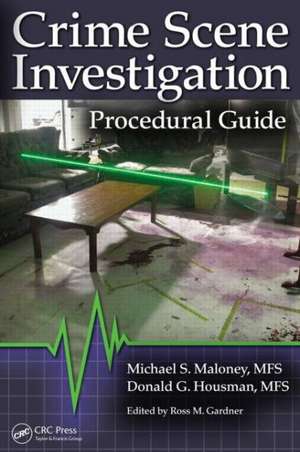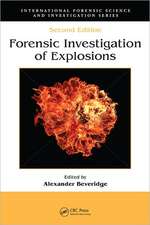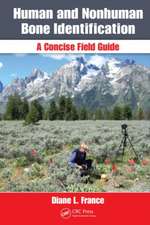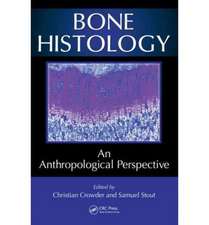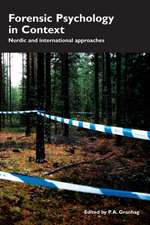Crime Scene Investigation Procedural Guide
Autor Michael S. Maloney, Donald Housman, Ross M. Gardneren Limba Engleză Paperback – 14 mai 2014
Using a bulleted format for quick, easy access, the authors provide hands-on, concise instruction in a style friendly to a range of professionals. Topics discussed in this practical manual include:
- Preparation for response, initial response, scene management, and scene evaluation/analysis
- Scene photography, videography, sketching, and search and processing procedures
- Steps to be taken prior to releasing the scene
- Response, documentation, processing, and collection of evidence for specific crimes against persons and property
- Evaluation, processing, collection, and preservation of all items of evidence encountered at the scene, including friction ridge evidence, two- and three-dimensional impression evidence, and trace and biological evidence
- Bloodstain pattern documentation and shooting incident documentation
| Toate formatele și edițiile | Preț | Express |
|---|---|---|
| Paperback (1) | 491.58 lei 6-8 săpt. | |
| Taylor & Francis – 14 mai 2014 | 491.58 lei 6-8 săpt. | |
| Hardback (1) | 989.92 lei 6-8 săpt. | |
| Taylor & Francis – 18 dec 2020 | 989.92 lei 6-8 săpt. |
Preț: 491.58 lei
Preț vechi: 578.33 lei
-15% Nou
Puncte Express: 737
Preț estimativ în valută:
94.06€ • 98.22$ • 77.67£
94.06€ • 98.22$ • 77.67£
Carte tipărită la comandă
Livrare economică 15-29 aprilie
Preluare comenzi: 021 569.72.76
Specificații
ISBN-13: 9781466557543
ISBN-10: 1466557540
Pagini: 348
Ilustrații: 106 black & white illustrations, 14 black & white tables
Dimensiuni: 156 x 234 x 25 mm
Greutate: 1.3 kg
Ediția:1
Editura: Taylor & Francis
Colecția CRC Press
Locul publicării:Oxford, United Kingdom
ISBN-10: 1466557540
Pagini: 348
Ilustrații: 106 black & white illustrations, 14 black & white tables
Dimensiuni: 156 x 234 x 25 mm
Greutate: 1.3 kg
Ediția:1
Editura: Taylor & Francis
Colecția CRC Press
Locul publicării:Oxford, United Kingdom
Notă biografică
Michael Maloney is a private consultant and trainer after retiring from a career in Federal Law Enforcement. He holds a Master of Forensic Science Degree from GWU with a Fellowship in Forensic Medicine. He has 20 years experience as a Special Agent with the Naval Criminal Investigative Service (NCIS) and Senior Instructor-Federal Law Enforcement Training Center for Death Investigations and Sex Crimes. He is the author of Death Scene Investigation: Procedural Guide and Crime Scene Investigation: Procedural Guide from CRC Press.
Don Housman is a private consultant, educator, and trainer. He retired from a career with the Naval Criminal Investigative Service (NCIS) where he was Chief of the Forensic Consultant Division. He holds a Master of Forensic Sciences degree from GWU with a Fellowship in Forensic Medicine. He has 23 years’ experience as a Special Agent with NCIS, and the FBI. He has co-authored four Forensic related books for the Department of Defense and is the co-author of Crime Scene Investigation: Procedural Guide from CRC Press.
Ross M. Gardner worked for the United States Army Criminal Investigation Command (USACIDC) as a felony criminal investigator for nearly twenty years. He subsequently served four years as the Chief of Police for the City of Lake City, Georgia, a small suburban Atlanta police department. He is now retired and active in independent consulting. Mr. Gardner holds a Master degree in Computer and Information Systems Management from Webster University, a Bachelors degree in Criminal Justice from Wayland Baptist University and Associates degree in Police Science from Central Texas College. He graduated first in his class at the Scenes of Crime Officers Course, New Scotland Yard, Hendon England. He is a former President of the Association for Crime Scene Reconstruction (ACSR) and has served as the Chairmen of the Education Committee for the International Association of Bloodstain Pattern Analysts (IABPA). He was a charter member of the FBI’s Scientific Workgroup on Bloodstain Pattern Analysis (SWGSTAIN) and chaired the Taxonomy and Terminology sub-committee for over ten years. Mr. Gardner was certified by the International Association for Identification as Senior Crime Scene Analyst from 1990-2012. He remains an active instructor and consultant throughout the United States and the world in crime scene analysis, bloodstain pattern analysis and crime scene investigation; teaching to a variety of groups ranging from investigative organizations to trial counsel professional development groups. He is co-author of Bloodstain Pattern Analysis, With an Introduction to Crime Scene Reconstruction, 3rd Edition and Practical Crime Scene Analysis and Reconstruction. Mr. Gardner also authored the text Practical Crime Scene Processing and Investigation 2nd Edition in 2004.
Don Housman is a private consultant, educator, and trainer. He retired from a career with the Naval Criminal Investigative Service (NCIS) where he was Chief of the Forensic Consultant Division. He holds a Master of Forensic Sciences degree from GWU with a Fellowship in Forensic Medicine. He has 23 years’ experience as a Special Agent with NCIS, and the FBI. He has co-authored four Forensic related books for the Department of Defense and is the co-author of Crime Scene Investigation: Procedural Guide from CRC Press.
Ross M. Gardner worked for the United States Army Criminal Investigation Command (USACIDC) as a felony criminal investigator for nearly twenty years. He subsequently served four years as the Chief of Police for the City of Lake City, Georgia, a small suburban Atlanta police department. He is now retired and active in independent consulting. Mr. Gardner holds a Master degree in Computer and Information Systems Management from Webster University, a Bachelors degree in Criminal Justice from Wayland Baptist University and Associates degree in Police Science from Central Texas College. He graduated first in his class at the Scenes of Crime Officers Course, New Scotland Yard, Hendon England. He is a former President of the Association for Crime Scene Reconstruction (ACSR) and has served as the Chairmen of the Education Committee for the International Association of Bloodstain Pattern Analysts (IABPA). He was a charter member of the FBI’s Scientific Workgroup on Bloodstain Pattern Analysis (SWGSTAIN) and chaired the Taxonomy and Terminology sub-committee for over ten years. Mr. Gardner was certified by the International Association for Identification as Senior Crime Scene Analyst from 1990-2012. He remains an active instructor and consultant throughout the United States and the world in crime scene analysis, bloodstain pattern analysis and crime scene investigation; teaching to a variety of groups ranging from investigative organizations to trial counsel professional development groups. He is co-author of Bloodstain Pattern Analysis, With an Introduction to Crime Scene Reconstruction, 3rd Edition and Practical Crime Scene Analysis and Reconstruction. Mr. Gardner also authored the text Practical Crime Scene Processing and Investigation 2nd Edition in 2004.
Cuprins
Crime Scene Investigation. Initial Response. Crime Scene Management. Crime Scene Notes and Observation. Crime Scene Videography and Photography. Crime Scene Sketching. Crime Scene Search Procedures. Aquatic Recovery of Evidence. Releasing the Scene and Postscene Activities. Crimes against Property. Burglary and Housebreaking. Larceny. Larceny of a Motor Vehicle. Vandalism and Malicious Mischief. Fire and Arson Scenes. Postblast (Explosive Incident) Scenes. Crimes against Persons. Aggravated Assault. Robbery from an Individual. Robbery from a Business. Carjacking. Kidnapping and Missing Persons. Rape and Sexual Assault. Injuries Commonly Associated with Violent Crime. Child Sexual Assault or Abuse. Child Physical Abuse. Child Neglect. Evidence Processing and Documentation. Friction Ridge Evidence. Impression Evidence. Biological Evidence at the Scene. Trace Evidence at the Scene. Entomological Evidence at the Scene. Use of Light and Alternate Light Sources (Oblique, UV, ALS, and RUVIS). Documenting and Processing Bloodstain Patterns at the Scene. Documenting and Processing the Shooting Scene. Appendices. Index.
Descriere
Specifically written for field use, this book provides a concise, ready source of information for the processing of the most commonly encountered crime scenes involving both persons and property. The book begins with the initial response and continues on to cover evidence documentation, processing, preservation, and collection. All aspects of scene procedure are covered to make sure investigators don't miss valuable clues that could make or break a case. The book includes a CD with downloadable forms needed for crime scene investigations.
